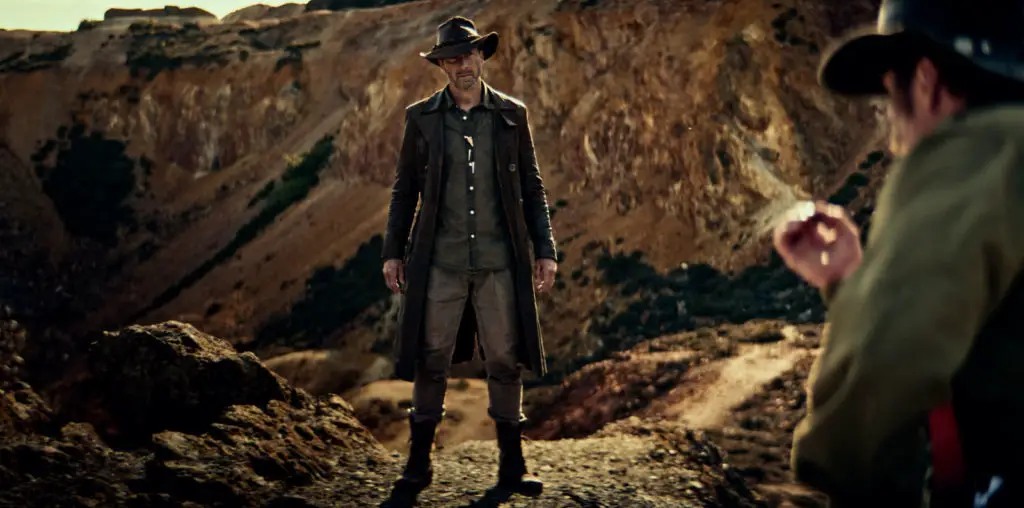
Morgan Spurlock is a young filmmaker in the mold of Michael Moore who shares the Oscar winning director’s flair for self promotion. Where Moore slouches in front of the camera and asks socially relevant questions, however, Spurlock makes himself the very question at the center of his film. In “Super Size Me” he offers himself up as a kind of McMartyr by resolving to eat nothing but McDonalds food three meals a day for one month in order to show the world what impact doing so will have on his own health. Well, to show Americans anyway. Spurlock’s countrymen are in essence his costars in that it is their ever greater intake of fast food, skyrocketing incidence of obesity and rising rate of heart disease which provide the impetus for the director’s ninety minute nutrition seminar.
Much of what the filmmaker sets out to teach us we already know too well. Anyone who’s tuned in a morning TV show or picked up a newspaper over the past decade will be unlikely to reel upon hearing Spurlock’sannouncement, for example, that 100 million Americans are overweight, one in four eats fast food every day or that obesity is now second only to cigarette smoking as the leading cause of preventable death in the United States.
Prior to embarking on his experiment, the filmmaker visits a battalion of doctors to access his physical condition and is determined to be in excellent shape. (They also monitor the decline in his health throughout the movie.) Spurlock also sets a few ground rules: He will eat only what he can purchase over the counter. He will order every item on the menu at least once. He will eat three meals each day and super size them only when invited to do so by McDonalds staff.
Spurlock’s girlfriend, a vegan chef, looks on in ever deepening horror as he ingests sausage biscuits for breakfast, Big Macs for lunch and double quarter pounders with cheese for dinner. The viewer looks on in horror as one of the first double quarter pounders with cheese Spurlock inhales makes a surprise reappearance 22 minutes later on an unsuspecting parking lot. Talk about special sauce.
In Moore-like fashion the filmmaker flits from topic to related topic. He interviews a former Surgeon General, the first to warn of the health risk posed by fast food abuse. He shows clips of a speech in which Secretary of Health and Human Services Tommy Thompson discusses the spike in the cost of battling the nation’s diabetes epidemic. He attends an inspirational public appearance by Jared “Big Pants” Fogel, the Subway spokesman who once weighed 425 pounds. Spurlock also suggests that ice cream emperors Burt Baskin and Ben Cohen to varying degrees have wound up casualties of the fun food culture they helped to promulgate.
Baskin, the director tells us, died of a heart attack at the age of 51 (the Baskin Robbins web site says 54). The Ben & Jerry’s cofounder, we are informed, underwent quintuple bypass heart surgery at 49. The implicit suggestion is that both scooped up too much of their own product though evidence of this is supplied in neither case. “Nobody ever suggested to me it was from eating too much ice cream,” corrected Cohen when I brought Spurlock’s diagnosis to his attention.
The filmmaker may be a tad hit or miss when it comes to certain facts, but his sociological hijinks are almost always on the money. In one scene, a group of tourists standing in front of the White House tries again and again to recite the pledge of allegiance from memory. They blow it every time. The minute they’re asked to call up that famous Big Mac recipe (“Two all beef patties, lettuce, cheese, etc”), they nail it. In another, he asks young school children to identify famous figures. George Washington and Jesus draw a number of blank stares. In contrast, every one of the kids recognizes Ronald McDonald.
Reviewers are divided as to the credibility of Spurlock’s experiment. No one disputes the fact that he put on 25 pounds, that his cholesterol shot up 65 points or that his liver showed signs of toxic shock. A question arises though as to whether Spurlock deliberately maximized the damage for dramatic effect. I couldn’t help noticing, for example, that even when he didn’t super size, he tended to order extra value meals voluntarily. Doing so increased his portion size unnecessarily. The director certainly cast the franchise’s salads as bit players in his film. And, though water, juice and diet soft drinks were available, Spurlock never seemed far from a tub of caffeine and sugar-fortified soda.
Similarly, he complained more and more as the movie progressed about headaches, lethargy, reduced sex drive and other subjective side effects. But when one of his doctors hooked him up to an EKG machine after Spurlock reported chest pain and shortness of breath, the results indicated nothing out of the ordinary.
So who knows what effect the sudden weight gain really had on him? The bottom line is “Super Size Me” may not tell us a whole lot we don’t already know (man wasn’t meant to live on fast food alone-duh) but it’s a gonzo stunt that’s going to make Spurlock one seriously fat cat all the same. Thanks to its success at Sundance, the film is guaranteed a lucrative theatrical run and the director is reportedly in talks with television executives about a spin off show. So what if he’s equal parts activist and showman? The same can be said of Michael Moore.
Beyond any contention is Morgan Spurlock’s gift for metabolizing common knowledge into uncommonly entertaining cinema.

Good article